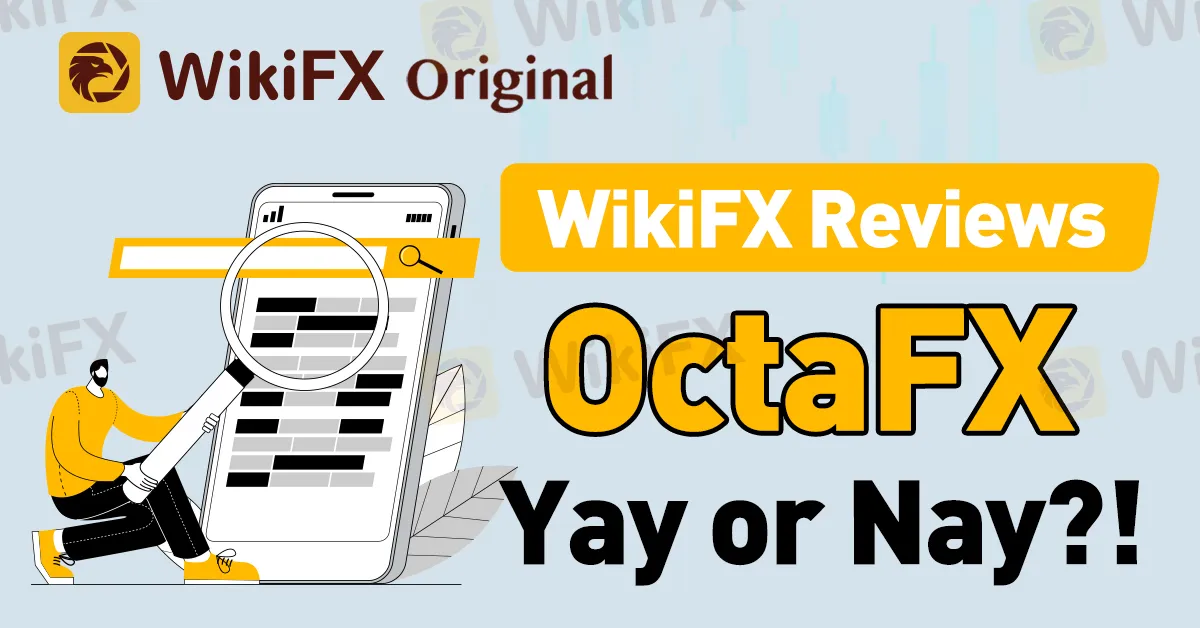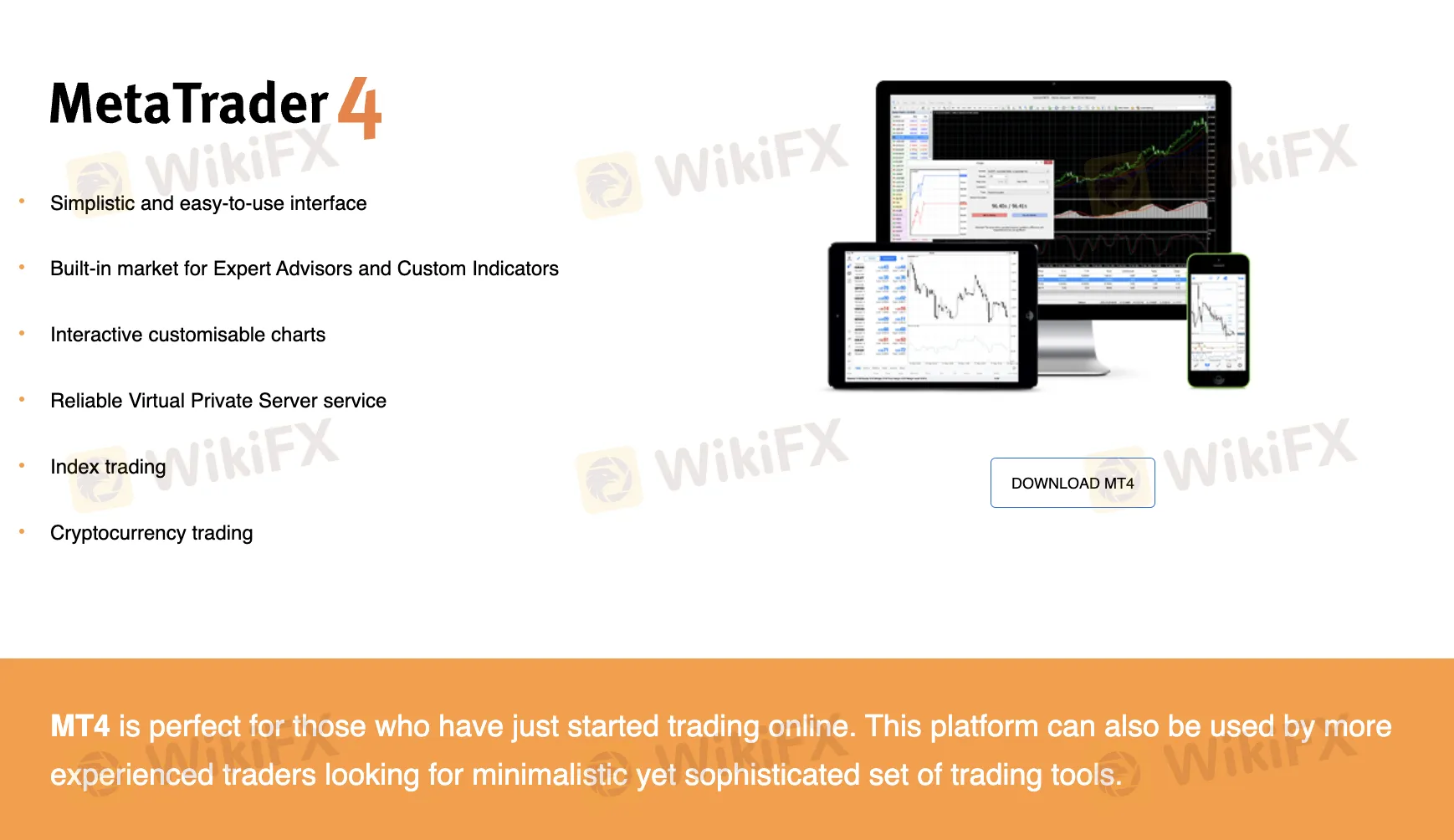简体中文
繁體中文
English
Pусский
日本語
ภาษาไทย
Tiếng Việt
Bahasa Indonesia
Español
हिन्दी
Filippiiniläinen
Français
Deutsch
Português
Türkçe
한국어
العربية
WikiFX Reviews OctaFX | Yay or Nay?!
Abstract:In today's article, WikiFX will explore OctaFX in depth, examining its features, fees, safety measures, deposit and withdrawal options, trading platform, and customer service to help you decide whether to use this platform. Keep reading to find out more!

Background:
OctaFX, an award-winning broker, was established in 2011 and is registered in St. Vincent and the Grenadines under license number 19776 IBC 2011, while being regulated by CySEC (372/18). With physical offices in Spain, Cyprus, and Malaysia, OctaFX has gained recognition in the industry.
Offering an extensive range of trading instruments, OctaFX provides access to 35 currency pairs, gold, silver, 3 energy assets, 10 indices, 30 cryptocurrencies, and 150 stocks. Traders can select between MT4 and MT5 accounts, which are renowned platforms in the industry.

OctaFX stands out with its low spreads and commission-free accounts, along with fast and free deposit and withdrawal methods, up to 50% margin increase, an exclusive replicated trading platform, and a highly rewarding IB program for referrals.
Types of Accounts:
The platform offers three types of accounts. The MT4 account is a commission-free option suitable for traders seeking a convenient and swift account setup, with spreads starting at 0.6. Tradable instruments include 35 currency pairs, gold, silver, 3 energy assets, 4 indices, and 30 cryptocurrencies (stocks are excluded).
The MT5 account, also commission-free, caters to innovative traders who prefer intelligent technical analysis. With spreads starting at 0.6, this account grants access to 35 currency pairs, gold, silver, 3 energy assets, 10 indices, 30 cryptocurrencies, and 150 stocks.

For traders requiring an Islamic account that adheres to Sharia principles, OctaFX offers an account type that retains all the key features of the regular accounts but eliminates interest.
Deposit & Withdrawal Methods:
OctaFX accepts deposits through various methods, including credit cards, bank wire transfers, e-wallets (e.g., Skrill and Neteller), and digital currencies, ensuring a seamless transfer process without any commissions or handling fees. It's important to note that deposit and withdrawal methods may vary based on the client's location, so it is advisable to consult customer service before opening an account. While users from certain countries can opt to pay with their local bank, this option is not available for users from Taiwan.
Generally, OctaFX returns funds using the same method as the initial deposit, and the withdrawal requests are processed and approved within 1-3 hours.
Trading Platforms:
OctaFX provides two trading platforms: MT4 and MT5, which are well-regarded in the industry. In cases where clients are unable to download or use the MetaTrader mobile application, OctaFX offers a solution by directly downloading their official mobile application to connect to a MetaTrader trading account.


Customer Support:
The OctaFX customer support team offers 24-hour service from Monday to Friday, ensuring high accessibility. They can be reached through live chat, phone, WhatsApp, Telegram, email, or even traditional mail. Additionally, the platform features a helpful FAQ section for individuals who prefer to find their own answers.
WikiFXs Verdict:
As a global forex broker regulatory query platform, WikiFX rates OctaFX with a WikiScore of 5.90 out of 10. While this score falls on the borderline, WikiFX advises users to consider brokers with a score of at least 7.0 and above. Consequently, let us delve deeper into the reasons behind OctaFX's score.

Octa Markets Cyprus Ltd, operating under the domain OctaFX.eu, is an investment firm registered in Cyprus and regulated by the Cyprus Securities and Exchange Commission (CySEC). However, as CySEC falls under tier-2 jurisdiction, its level of protection may have certain limitations, making OctaFX a potentially risky choice for Forex and CFD trading.

This is because in the forex industry, regulatory bodies play a crucial role in ensuring the fairness, transparency, and security of trading activities. These bodies establish and enforce regulations that brokers must adhere to, providing protection to traders and maintaining the integrity of the market.
Tier-1 regulatory bodies are generally considered to be the most stringent and reputable in the forex industry. Examples of tier-1 regulators include the Financial Conduct Authority (FCA) in the United Kingdom, the Securities and Exchange Commission (SEC) in the United States, and the Australian Securities and Investments Commission (ASIC). These regulators have strict guidelines and robust enforcement mechanisms to oversee the operations of brokers under their jurisdiction.
On the other hand, tier-2 regulatory bodies, while still offering some level of supervision, may have less stringent requirements compared to their tier-1 counterparts. Examples of tier-2 regulators include the Cyprus Securities and Exchange Commission (CySEC) and the Financial Services Commission (FSC) in Mauritius. These regulators often have less stringent capital requirements, fewer regulatory checks, and may provide a less comprehensive level of protection to traders.
It is generally recommended to choose a broker regulated by a tier-1 regulatory body due to several key advantages:
Stronger Investor Protection: Tier-1 regulators impose strict rules and requirements on brokers to ensure the safety of client funds. They often require brokers to segregate client funds from their own operational funds, providing an extra layer of protection in the event of broker insolvency.
Stringent Operational Standards: Tier-1 regulators set high operational standards for brokers, including risk management protocols, client disclosure requirements, and internal control systems. These standards aim to prevent fraudulent activities, conflicts of interest, and market manipulation.
Rigorous Compliance and Auditing: Tier-1 regulators conduct thorough compliance checks and regular audits of regulated brokers to ensure ongoing compliance with regulations. This helps maintain transparency and accountability within the industry.
Dispute Resolution Mechanisms: Tier-1 regulators often provide robust dispute resolution mechanisms, such as ombudsman services or dedicated investor compensation funds, which can help protect traders in case of disputes with brokers.
Choosing a broker regulated by a tier-1 regulatory body offers traders a higher level of confidence and trust in the broker's operations. It provides greater assurance that the broker operates in a transparent and fair manner, prioritizing the interests of its clients. Thus, this explains why despite OctaFXs popularity in the market, it did not obtain a high WikiFX score as a whole.

Disclaimer:
The views in this article only represent the author's personal views, and do not constitute investment advice on this platform. This platform does not guarantee the accuracy, completeness and timeliness of the information in the article, and will not be liable for any loss caused by the use of or reliance on the information in the article.
Read more

The Daily Habits of a Profitable Trader
Every professional trader follows a structured approach to ensure they are well-prepared, disciplined, and able to seize opportunities with confidence. Whether you are a seasoned investor or an aspiring trader, adhering to a robust daily checklist can significantly enhance your performance. Use this checklist to check if you are a qualified trader

The Impact of Interest Rate Decisions on the Forex Market
Interest rate changes determine currency attractiveness, influencing capital flows and exchange rate trends. Understanding this mechanism helps investors navigate the forex market effectively.

How a Housewife Lost RM288,235 in a Facebook Investment Scam
A 47-year-old housewife in Malaysia recently fell victim to an online investment scam, losing a substantial sum of RM288,235 after engaging with a fraudulent scheme advertised on Facebook.

A Trader’s Worst Mistake: Overlooking Broker Reviews Could Cost You Everything
In today’s digital age, reviews influence nearly every decision we make. When purchasing a smartphone, television, or home appliance, we pore over customer feedback and expert opinions to ensure we’re making the right choice. So why is it that, when it comes to choosing an online broker where real money and financial security are at stake many traders neglect the crucial step of reading reviews?
WikiFX Broker
Latest News
The Withdrawal Trap: How Scam Brokers Lure Victims into Paying More
FCA to Investors: Think Twice Before Trusting These Brokers
Trump\s tariffs: How could they affect the UK and your money
Trump gambles it all on global tariffs he\s wanted for decades
TradingView Brings Live Market Charts to Telegram Users with New Mini App
Trump tariffs: How will India navigate a world on the brink of a trade war?
Interactive Brokers Launches Forecast Contracts in Canada for Market Predictions
Authorities Alert: MAS Impersonation Scam Hits Singapore
IG Group Acquires Freetrade for £160M to Expand UK Investment Market
U.S. March ISM Manufacturing PMI Released
Currency Calculator







